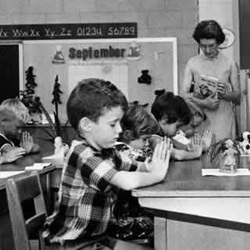Prayer in Public Schools
Santa Fe ISD vs. Jane Doe

In Santa Fe, April 1993, a young seventh grade girl was in her Texas History class. It was then that her teacher started to hand out flyers advertising a Baptist religious revival. Once the teacher had learned the young girl was a Mormon, he began to discuss with the class how Mormonism was non-Christian and cult-like. After upsetting the young girl, she went home and complained to her mom about how she was treated in the classroom. Two days later, the girl's mother complained to the Santa Fe school district. The teacher was given a written admonishment and was directed to apologize to the family and his class for violating the schools written policy. The written policy banned any kind of religious literature in class and verbal abuse of any student.
Throughout the 1992-93 and 1993-94 school years, the Santa Fe school district allowed students to read openly Christian prayers at graduation ceremonies and home football games. These prayers were presented as "invocations' or "benedictions" for the events. The Santa Fe school district upheld complete control over the programs and the facilities while the students were reading the prayers, consisting of the potential to cut off the microphone. The same family that filed the complaint against the teacher in 1993 went to some of the home football games. In April 1995, the girl's parents as well as a second family (the "Does") filed a lawsuit against the school district in federal court. They claimed the district's policies and practices were violating the Establishment Clause of the First Amendment.
In December 1996, the federal court ruled that Santa Fe ISD's policies were unconstitutional. The U.S. District Judge, Sam Kent, stated that prayer could remain part of the school districts graduation ceremonies and pre-game acts, but only if the students composed and presented the prayer and only if it was non-sectarian and non-persuasive. The Santa Fe school board appealed to the 5th Circuit Court of Appeals.
In February of 1999, a subdivided appeals court agreed that, although the prayers at graduation ceremonies were constitutional, the students were not allowed to use the schools public addressing system for their prayers at home games.
Throughout the 1992-93 and 1993-94 school years, the Santa Fe school district allowed students to read openly Christian prayers at graduation ceremonies and home football games. These prayers were presented as "invocations' or "benedictions" for the events. The Santa Fe school district upheld complete control over the programs and the facilities while the students were reading the prayers, consisting of the potential to cut off the microphone. The same family that filed the complaint against the teacher in 1993 went to some of the home football games. In April 1995, the girl's parents as well as a second family (the "Does") filed a lawsuit against the school district in federal court. They claimed the district's policies and practices were violating the Establishment Clause of the First Amendment.
In December 1996, the federal court ruled that Santa Fe ISD's policies were unconstitutional. The U.S. District Judge, Sam Kent, stated that prayer could remain part of the school districts graduation ceremonies and pre-game acts, but only if the students composed and presented the prayer and only if it was non-sectarian and non-persuasive. The Santa Fe school board appealed to the 5th Circuit Court of Appeals.
In February of 1999, a subdivided appeals court agreed that, although the prayers at graduation ceremonies were constitutional, the students were not allowed to use the schools public addressing system for their prayers at home games.
